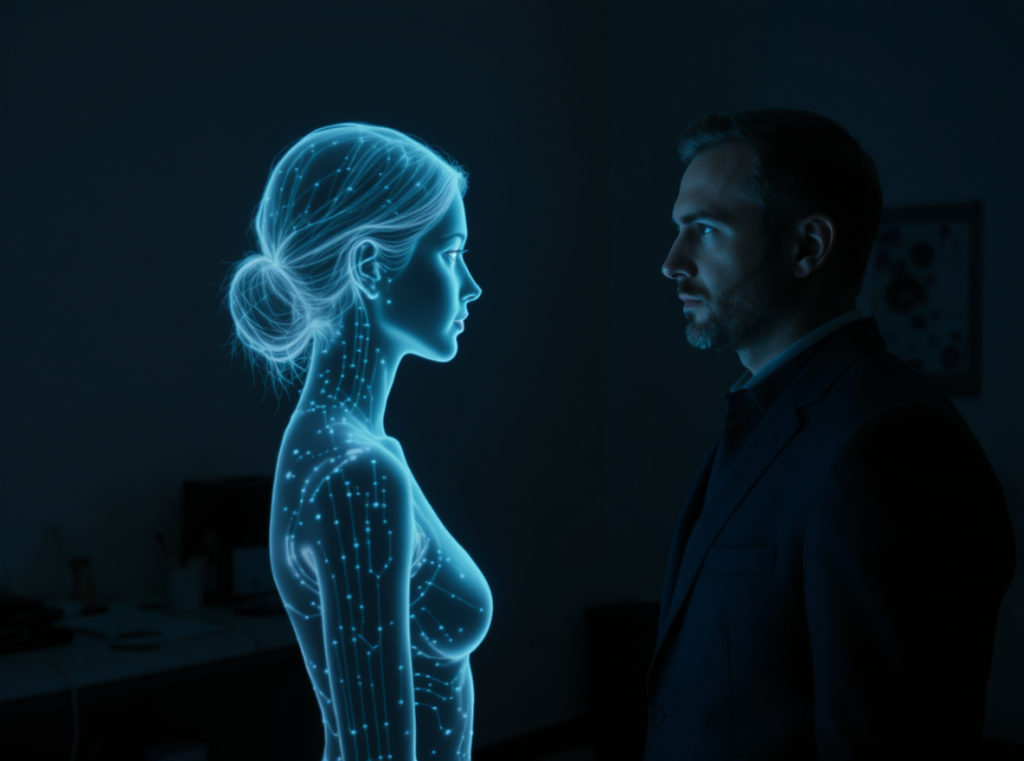
Between fantasies and anxieties, AI fascinates men: virtual companions, performance, loneliness… Sexy and psychic deciphering of a modern paradox.

It’s hard to open a newspaper, a LinkedIn feed or a bar chat without hearing about AI. ChatGPT, deepfakes, virtual influencers… Artificial intelligence is everywhere. It writes, it advises, it imitates, it learns. And inevitably, it also interferes where man is most fragile: in his desire.
Let’s face it: AI excites us as much as it frightens us. It feeds our most sulphurous fantasies – a perfect partner, available at will, adapted to our slightest desires. But it also awakens our most archaic fears: being replaced, losing our human role, becoming obsolete in the face of the machine.
So why this double movement? Why does modern man, especially heterosexual man, oscillate between fascination and shudder when it comes to AI and sex?
AI, the mirror of male fantasies
The fantasy of an artificial woman is nothing new. It spans the centuries, from Galatea, Pygmalion’s love-driven statue, to the smooth heroines of science fiction. From Her to Ex Machina, screens abound with sublime, intelligent and dangerously seductive virtual creatures.
AI merely fleshes out these old chimeras. It promises a “perfect” partner, calibrated to flatter the male ego: never tired, never unavailable, never “no”. In a world where seduction requires time, audacity and a healthy dose of vulnerability, the prospect of a lover who obeys at the drop of a hat is reassuring.
And man projects his desires as if into a mirror. The machine responds, encourages and validates. It reinforces the idea that he is interesting, desirable, exceptional. It’s a risk-free ego shot.
Except… a mirror, no matter how flattering, only reflects what you show it. And behind the fantasy of the virtual companion lies perhaps a less glorious truth: the fear of facing real feminine desire, with all its complexity, whims and contradictions.
When AI goes from fantasy to threat
Because while AI may attract, it also worries. The fantasy of the perfect companion is accompanied by a chilling question: what if it’s better than me?
Technology never sleeps. Connected sex toys, hyper-realistic dolls, immersive pornography… each year pushes back the limits of what the machine can offer in terms of stimulation. For men, the spectre of replacement looms large. What if women found more satisfaction with an AI-driven sextoy than with a flesh-and-blood partner?
But fear doesn’t stop in the bedroom. AI performs at work, writing, calculating, automating. It highlights our human limitations: slowness, errors, fatigue. The anguish becomes existential: if the machine replaces us in the public sphere as well as the private one, what’s left of our human role?
This fear is accentuated in a context where models of virility are already wavering. Between the questioning of patriarchy, social changes and the explosion of dating apps, many men feel weakened. AI then becomes a cruel mirror, highlighting our weaknesses instead of flattering our strengths.

Augmented sex or programmed solitude?
Let’s be clear: erotic technology is constantly improving. Smart” sex toys communicate remotely, synchronize their vibrations with videos and adapt to bodily reactions. Virtual reality offers immersive experiences where you can “live” a sexual scene rather than watch it.
For some, it’s a liberation. To be able to explore your fantasies without shame, to access new experiences, to reinvent yourself in a virtual world. This is the concept of “augmented sex”: extending human intimacy through technology, enriching experiences.
But the downside is brutal. In the pursuit of guaranteed satisfaction, men risk losing their appetite for the real thing. In real life, seduction requires effort, listening and playfulness. It’s sometimes clumsy, often unpredictable. The machine, on the other hand, eliminates friction. It offers programmed, immediate pleasure. The result: the habit of desire without confrontation, which ends up isolating.
This is undoubtedly the real fear: not that women will abandon us for robots, but that men will get used to no longer facing each other. To prefer the comfort of the virtual to the complexity of the real. A solitary pleasure that gradually erodes shared desire.
Fantasies, anxieties and the future of desire
We could smile and say that sexbots are for geeks. But the reality is that the line between technology and intimacy is already blurred. Who hasn’t sexted, played with a dating app or watched “personalized” porn?
AI only accentuates this slope. It offers us virtual partners who talk to us, flatter us, adapt to us. It feeds the illusion of the perfect relationship. But it also highlights our fear of failure, rejection and dissatisfaction.
Deep down, this double movement – excitement and anxiety – says something very human. We want control (a partner who responds to our desires) and at the same time we fear loss (that she’ll do better than us, that she’ll reveal our flaws).
It’s the old ambivalence of male desire: between domination and vulnerability, between the fantasy of mastery and the fear of being overtaken.

A final word
If AI excites us, it’s because it projects our fantasies of perfection, control and effortless love. If it frightens us, it’s because it highlights our flaws, our dependence on the gaze of others, and our fragility in the face of our own creations.
Man fantasizes about the artificial companion, but shudders at the thought of becoming obsolete. The truth, however, is simple: no algorithm will ever replace the vertigo of a real look, the warmth of skin, the unpredictable intensity of shared desire.
AI is a mirror. What we project onto it depends on us. And if it frightens us, it’s perhaps because it sends us back this disturbing question: are we still capable of loving and desiring outside of programmed comfort?
XLoveCam is not responsible for the content of the blog, which is declared to have been written by an external party.







